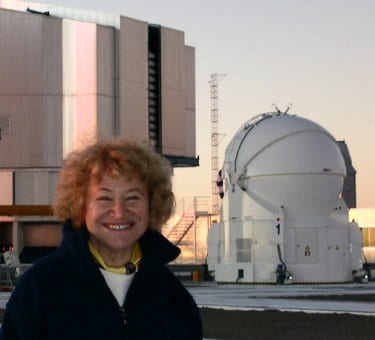
Catherine Cesarsky (Courtesy: ESO)
By João Medeiros
It’s the year of deflation, the year of Obama, and the International Year of Astronomy. It started here in Paris, the City of Lights, by the Eiffel Tower, at the UNESCO HQ. The Opening Ceremony attracted more than 100 countries represented by astronomers, industrialists, diplomats, artists, a Kepler impersonator and the odd journo. We are celebrating 400 years since Galileo, the father of modern science, turned the telescope up and saw something amazing.
Catherine Cesarsky, president of the International Astronomical Union, said the vision for the International Year of Astronomy is going to be geared outwards, towards the public.
“After years of preparation, the time has come to launch this year, during which the citizens of the world will rediscover their place in the Universe, and hear of the wondrous discoveries in the making. “
Indeed, the lofty goal of the IYA 2009 is not to launch a super science program but to return astronomy to the public through a series of initiatives that will include the Dark Skies Awareness a reclassification of archaeoastronomy sites as UNESCO´s world heritage sites.
Speaking to Physics World, Catherine Cesarsky, expressed how much she wishes that astronomy reaches the public again, as an entry point to science and to a scientific world view, so necessary today. She said that, from her own experience, the younger generations, 10 to 14 years olds, are usually enthralled by astronomy popular lectures. However, from then on, adolescence kicks in and it becomes harder to excite the audiences — it’s difficult for a teenager to appreciate the mysteries of the universe when its hormones are playing no rules football. But it doesn’t matter much, Cesarsky believes, since the most important part of science communication is to plant the seed for the excitement for the wonders of science when they are really young.
Cesarsky also worries about the gender asymmetry in the physical sciences and about the “leaky pipeline effect”: you get a fair proportion of women at undergraduate level that somehow are all but gone in academia. The discrimination, fortunately, is not as palpable as it was back in the days when Cesarsky did her studies in Buenos Aires. Obviously a bright student, she was once complimented by her head of department in the following nuanced manner “It’s funny, I always thought physics wasn´t for women”.
The conference opened with a series of talks on Mayan and Islamic astronomy. I’ve always been fascinated by the role played by ancient astronomy in society, bridging primordial religious experience to a fundamental relevance to agriculture and economy. According to Martin Rees, also present in the ceremony, “astronomy is, if not the first, the second oldest science, after medicine”.
Throughout history, astronomy inexorably lost relevance to society. However, it still relates with the big and the meta-questions. To Cesarsky, that’s where the relevance of astronomy lies: “We have one sky, and that’s what should truly unite people. Astronomy, like other sciences, but astronomy in particular, is a peaceful, soul-searching activity that encourages a truly global culture.”
Of course, 2009, is also the year of Darwin. In the words of Martin Rees, “Both astronomy and Darwinism provide a beautiful narrative for humanity, that starts right from the beginning until the intelligent species that we are today”.



